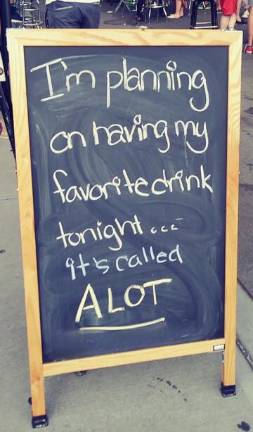Liquor Law Overhauls Too Lenient Say Community Activists
While the Hospitality Alliance which lobbies on behalf of the restaurant and bar industry praised the recent overhaul in the state liquor laws, two longtime community activists blast the changes that they say will make overcrowded streets and sidewalks less safe while driving out other small businesses that residents value.

For weeks, high-powered “hospitality” lobbyists have been crowing over “significant changes” to liquor licensing laws they just got on Albany’s annual spring gift list known as the Governor’s Budget. From way back before the pandemic, the restaurant-liquor industrial complex has been looking to “modernize” the way licenses are passed out. Then, under the category of “let no crisis go to waste,” they found that the pandemic gave them just enough public pity and political sympathy to start checking the boxes on their long-term wish lists.
First up were new rules and laws that let bars sell cocktails on the sidewalk and roadway. Before the pandemic, any restaurant or bar or lounge needed a separate license for outdoor service. In 2020, Governor Andrew Cuomo allowed bars to take their indoor license outdoors as an “emergency” and “temporary” measure. In 2024, Governor Kathy Hochul has given up the fiction that the alcohol lobby ever gives back anything that helps them sell more alcohol to more people in more neighborhoods. Outdoor dining was made legal in New York City last August–but last month Hochul made outdoor imbibing a mere “alteration” of long-term state drinking law.
Then the governor threw in–a stocking stuffer?–another temporary-now-permanent present to New York’s barmen. That would be the fundamental right to serve alcohol across a bike lane. Our governor thinks there’s nothing wrong with asking wait staff to weave through squads of e-bikes with trays of margaritas, just as long as it makes a profit for their boss. This dangerous dance is called “a technical correction” of the law! Take-away drinks? That’s still “temporary” –if you can bring yourself to believe that another five years is “temporary.”
And there are still two more bills before the state legislature that would flood yet more alcohol into the Manhattan neighborhoods that already have the highest ratio of bars-to-residents in all of New York State.
The first is A8427a, a bill that would help landlords quickly flip previously unlicensed spaces to yet more bars with full-on On-Premises liquor licenses. A “previously unlicensed space” is that shoe repair, laundromat or hardware store that you actually need if you live in New York. Current law dictates that OP licenses be issued only after a multi-step process that considers whether it’s in the “public interest” to open yet another liquor-dispensing business in an area that already has plenty of them. It’s such a serious decision that only the Full Board of the State Liquor Authority has the right and power to decide on what is in the “public interest.”
But the new legislation—sponsored by State Senator Jessica Ramos and Assembly Member Harvey Epstein—would let a landlord dispose of that butcher, baker, or new-tech maker by making it quick and easy for a new bar to get a “temporary” license [which will be paying top-dollar rent to that landlord]. And this would happen before the State Liquor Authority has exercised its unique power to determine just what the “public interest” means on your street.
Why would any legislator want to help a landlord convert a shoe repair space to a bar? The standard reason is that the State Liquor Authority has a long licensing backlog. This legislation would cut the waiting time by giving a “temporary” license to that bar before the full legal licensing process has been completed.
But is that license really “temporary?” Once that bar is up and running with its “temporary” license, will the SLA really take it away if it eventually decides that it is not in the “public interest?” No way. Anyone who regularly watches SLA hearings knows that bar owners easily convince the commissioners that the bar owner’s economic needs are the SLA’s economic imperative: get them licensed and keep them licensed!
So, our legislature could now solve a truly temporary licensing backlog with yet more “temporary” licenses that won’t be temporary at all. Look around your neighborhood. Once a storefront flips from mom-and-pop bodega to buzz-fed bar, has it ever flipped back to something that you might find useful? Like a stationery or children’s clothing store?
And that “public interest” requirement? It comes from the 1993 Padavan law that for over thirty years has given residents a way to fight the rising tide of bars, restaurants, and clubs in their neighborhoods. Therefore, it should come as no surprise that our legislature is also considering a bill—S6785, sponsored by Senator James Skoufis from the oh-so-quiet Hudson Valley—that would get rid of that protection too.
Why? Because some legislators think that considering the “public interest” gets in the way of “economic development”—a popular legislative term that translates as “we can’t think of any other way to get more tax revenues than by pushing alcohol – and cannabis and casinos.”
You might want to let your state legislator know that you are part of the “public” and that it is in the legislature’s “interest” to hear your opinions on appropriate “economic development.”
Leslie Clark and Augustine Hope are members of the West Village Residents Association.
“Why would any legislator want to help a landlord convert a shoe repair space to a bar?” Leslie Clark and Augustine Hope, West Village Residents Association